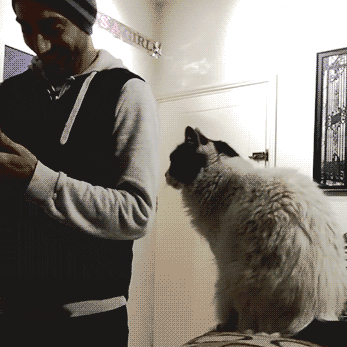5 Signs Your Cat Isn't As Domesticated As You Think

Cats are adorable! They're small. They're round. They're fluffy. And they're also pretty much hardwired to be tiny killing machines. As tame and trained as our domestic feline friends may seem, there is no denying that they still have a wild side. Domestic cats are still driven by their natural instincts, passed down for generations from their wild ancestors.
Even though our friendly balls of fluff have never actually hunted in the jungles or stalked the deserts of Africa, those wild instincts are still present in our cats today -- and these instincts help explain common cat behaviors that baffle us humans.
1. Hunting Prey

Cats are hardwired to hunt and stalk prey, even if they have food available to them every day. In fact, hunting and stalking help keep your cat’s mind and body strong and healthy in an environment that can easily become unstimulating and boring to a cat.
For ideas about how to activate your cat’s hunting instincts, consider toys that imitate the movements of real prey.
And if your cat has a really high prey drive, they might need some mental stimulation even when you aren’t home to play. Battery-operated toys can be an ideal choice, hiding treats around the house for them to find, or consider adding a food puzzle into their meal routine!
2. Marking Territory

Your cat isn’t scratching the arm of your sofa out of a wanton desire for destruction. Believe it or not, cats actually scratch as a form of communication to other cats – and us humans, if we know how to read cat.
By leaving a visual mark on visible areas of the house (the ends of couches or chairs, for instance), your cat is letting anyone and everyone know that a cat lives here and that this is their territory. If your cat is a problem scratcher, here are some great solutions!
Cat paws also have hidden scent glands, and they use these secret scent glands to mark their territory. Besides the visual markers that scratching a post or chair leaves, every time your cat scratches, she is also leaving behind her scent -- effectively claiming it as her turf.
These pheromones are pretty much undetectable to our human noses, but other cats or animals in the home will be able to sniff out that message loud and clear: This is MY house!
3. Perching Up High

Photo Featuring the Jungle Gym Cat Tree 2.0
Perching helps cats stay safe from predators while they keep a close eye on their surroundings and potential prey. Even cats who don’t live with other animals (potential predators) or have regular access to live prey have an innate desire to perch high.
Interestingly enough, cats will show their status in the feline hierarchy by how they're situated vertically. The higher they perch, the higher their status in the hierarchy.
Offering a vertical space for your cat to climb and perch on can also be helpful in multi-cat households, offering plenty of space for each cat to establish their own "space" in the hierarchy. If you have a cat who prefers to perch up high, consider offering a sheltered cat tree from which to perch.
4. Seeking Fresh Water

Does your cat prefer fresh, running water to their water bowl? Do they come running anytime you turn on the sink? Your cat's instincts might be telling them that an old, stagnant bowl of water could be contaminated and unhealthy to drink.
Most of us also naturally place our cat's food and water bowls next to each other. But this placement can actually go against a cat's natural instinct to keep food and water separate. In the wild, cats will often go to great measures to keep their food and water sources separate to avoid having the food contaminate the water.
Try a circulating water fountain designed for cats that prefer running water to encourage your cat to drink more - without you having to leave the faucet running!
5. Scent Marking

Have you ever wondered why your cat rubs their face on the edges of furniture, walls, or even your foot? Cats have scent glands on their face and the base of their tail. When they push their head onto your hands or feet, they're scent-marking you, letting the whole world know (in their own secret, pheromone-encrypted way) that you belong to them.




















My Mosie was left in a compost bin on Easter Sunday. She was only four days old. She’s done incredibly well and is four months old now. She’s very long and slender; long legs and an exotic profile. That compost bin is where I feed my colony of ferals. They’re all fixed. I still think of her as their little niece! She believes I’m her mom and nurses on the inside of my arm, then jumps up to kiss my face.
I’ve watched her closely as I’ve raised over five hundred orphaned or abandoned kittens. She’s just different. She tries to bury her food! Even covering it with paper works for her. She carries her stuffed bear around a lot. She’s fearless and pounces on my other cats. She’ll be a great cat. So glad we found each other!
I had 3 cats, the oldest was adopted from a vet, the second and third cats were feral. I had basically no interaction with the feral cats. When I had to put down the oldest 14 yrs old that I adopted from the vet, the feral cats now have become very attached to me. Jack is 11 and Jilli is 9. After all these years I was in total shock. Has anyone ever experienced this?
I have a little cat game on my iPad with swimming fish…My cat Leo loves to bat at them and seeing the simulation of water being splashed around and ripples.. my cat was very intrigued… what was cute was that after Leo had enough… he took his paw off the screen then shook it several times like he was getting the “water” off it then proceeded to clean his little foot…. instinct is cute❤️🤗
Leave a comment